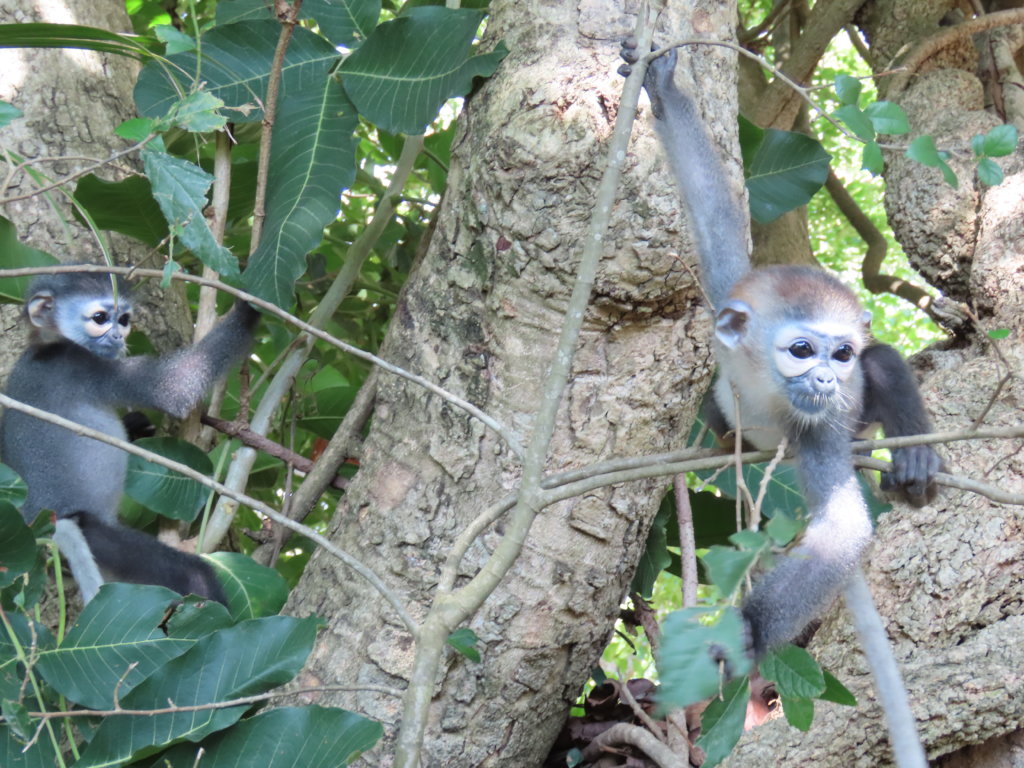By Nick Marx | Director, Wildlife Rescue & Care Program
Phnom Tamao Wildlife Rescue Centre (PTWRC) does not specialize in any one species, but rather must care for a complete cross section of whatever wildlife is rescued from the illegal trade in Cambodia. Each year we receive around 2,000 rescued animals that cannot be immediately returned to the wild. Many of these are babies, and with limited funds we must do our best to cater for the individual needs of each species. Recently there has been a spate of black-shanked douc langurs, a very beautiful and Critically Endangered primate, which previously we very seldom received at PTWRC. Over the same period, many macaques, which are an extremely common species, were also rescued.
As standard practice, infant animals are always taken to our Baby Nursery and our keepers do an outstanding job, administering the necessary 24-hour care. Species cared for include many different kinds of fledgling birds and baby mammals, including deer, small carnivores, primates and rodents. Three infant doucs were rescued by our Wildlife Rapid Rescue Team (WRRT) in February 2020. However, the first two doucs suffered from fits and died a few days after rescue. Previously, we lost a couple of silvered langurs in a similar manner. At first I thought that it was the fault of our keepers. However, on investigating further and considering the symptoms, I suspected the langurs had contracted the Herpes virus. This disease is endemic in yet harmless to macaques, but can affect other primates more seriously. Although infant langurs and macaques are never kept together, I made a point of ensuring greater separation in the care of langurs and macaques, particularly concerning feeding utensils and caging. The third infant douc arrived later in February than the others and upon her arrival we decided that instead of caring for her in the Nursery she would be taken to the Elephant Section, far away from any macaques, to be looked after by two of our elephant keepers. Most zoos and rescue centres have difficulty hand raising baby douc langurs and we had never successfully raised this species before, so there seemed little to lose. Elephant keepers Sol and Vok shared the duties of the feeds every two hours for little You-bie and unlike our previous doucs, she has thrived!
During May and June 2020, another three infant douc langurs arrived at PTWRC. Like You-bie, all were sick and malnourished when they arrived, all were transferred to the Elephant section for care, and all have steadily gained weight and done well when isolated from all other species. Black-shanked douc langurs are extremely rare and it is important that rescued doucs survive. They appear not to do well in captivity. However, species are different and each has different requirements and sensitivities. It is important to pay attention to the correct diet – langurs are primarily leaf-eaters – and susceptibility to specific diseases. We have removed the possibility of infection from other primates, our douc langurs are doing very well now, and we are hopeful that we have finally solved the mystery of how to successfully hand-raise this rare and sensitive species. As a GlobalGiving donor who helps us care for rescued animals in Cambodia, your contributions enable us cover the unpredictable costs, and solve the challenges, that arise when new animals arrive at PTWRC.
Links:
Project reports on GlobalGiving are posted directly to globalgiving.org by Project Leaders as they are completed, generally every 3-4 months. To protect the integrity of these documents, GlobalGiving does not alter them; therefore you may find some language or formatting issues.
If you donate to this project or have donated to this project, you can receive an email when this project posts a report. You can also subscribe for reports without donating.
Support this important cause by creating a personalized fundraising page.
Start a Fundraiser